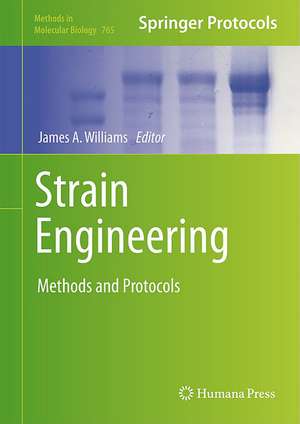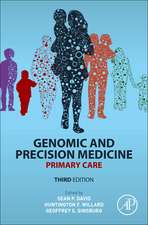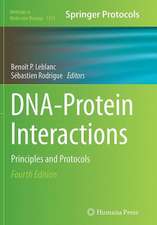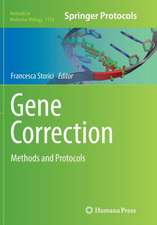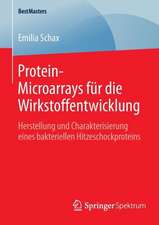Strain Engineering: Methods and Protocols: Methods in Molecular Biology, cartea 765
Editat de James A. Williamsen Limba Engleză Hardback – 15 iul 2011
Authoritative and accessible, Strain Engineering: Methods and Protocols serves as an ideal guide to scientists in academia, pharmaceutical science, and biotechnology who perform microbial strain engineering.
| Toate formatele și edițiile | Preț | Express |
|---|---|---|
| Paperback (1) | 796.37 lei 6-8 săpt. | |
| Humana Press Inc. – 23 aug 2016 | 796.37 lei 6-8 săpt. | |
| Hardback (1) | 1113.99 lei 6-8 săpt. | |
| Humana Press Inc. – 15 iul 2011 | 1113.99 lei 6-8 săpt. |
Din seria Methods in Molecular Biology
- 9%
 Preț: 791.63 lei
Preț: 791.63 lei - 23%
 Preț: 598.58 lei
Preț: 598.58 lei - 20%
 Preț: 882.98 lei
Preț: 882.98 lei -
 Preț: 252.05 lei
Preț: 252.05 lei - 5%
 Preț: 802.70 lei
Preț: 802.70 lei - 5%
 Preț: 729.61 lei
Preț: 729.61 lei - 5%
 Preț: 731.43 lei
Preț: 731.43 lei - 5%
 Preț: 741.30 lei
Preț: 741.30 lei - 5%
 Preț: 747.16 lei
Preț: 747.16 lei - 15%
 Preț: 663.45 lei
Preț: 663.45 lei - 18%
 Preț: 1025.34 lei
Preț: 1025.34 lei - 5%
 Preț: 734.57 lei
Preț: 734.57 lei - 18%
 Preț: 914.20 lei
Preț: 914.20 lei - 15%
 Preț: 664.61 lei
Preț: 664.61 lei - 15%
 Preț: 654.12 lei
Preț: 654.12 lei - 18%
 Preț: 1414.74 lei
Preț: 1414.74 lei - 5%
 Preț: 742.60 lei
Preț: 742.60 lei - 20%
 Preț: 821.65 lei
Preț: 821.65 lei - 18%
 Preț: 972.30 lei
Preț: 972.30 lei - 15%
 Preț: 660.49 lei
Preț: 660.49 lei - 5%
 Preț: 738.41 lei
Preț: 738.41 lei - 18%
 Preț: 984.92 lei
Preț: 984.92 lei - 5%
 Preț: 733.29 lei
Preț: 733.29 lei -
 Preț: 392.60 lei
Preț: 392.60 lei - 5%
 Preț: 746.26 lei
Preț: 746.26 lei - 18%
 Preț: 962.66 lei
Preț: 962.66 lei - 23%
 Preț: 860.22 lei
Preț: 860.22 lei - 15%
 Preț: 652.64 lei
Preț: 652.64 lei - 5%
 Preț: 1055.50 lei
Preț: 1055.50 lei - 23%
 Preț: 883.87 lei
Preț: 883.87 lei - 5%
 Preț: 1141.13 lei
Preț: 1141.13 lei - 19%
 Preț: 491.89 lei
Preț: 491.89 lei - 5%
 Preț: 1038.86 lei
Preț: 1038.86 lei - 5%
 Preț: 524.16 lei
Preț: 524.16 lei - 18%
 Preț: 2122.34 lei
Preț: 2122.34 lei - 5%
 Preț: 1299.23 lei
Preț: 1299.23 lei - 5%
 Preț: 1339.12 lei
Preț: 1339.12 lei - 18%
 Preț: 1390.26 lei
Preț: 1390.26 lei - 18%
 Preț: 1395.63 lei
Preț: 1395.63 lei - 18%
 Preț: 1129.65 lei
Preț: 1129.65 lei - 18%
 Preț: 1408.26 lei
Preț: 1408.26 lei - 18%
 Preț: 1124.92 lei
Preț: 1124.92 lei - 18%
 Preț: 966.27 lei
Preț: 966.27 lei - 5%
 Preț: 1299.99 lei
Preț: 1299.99 lei - 5%
 Preț: 1108.51 lei
Preț: 1108.51 lei - 5%
 Preț: 983.76 lei
Preț: 983.76 lei - 5%
 Preț: 728.16 lei
Preț: 728.16 lei - 18%
 Preț: 1118.62 lei
Preț: 1118.62 lei - 18%
 Preț: 955.25 lei
Preț: 955.25 lei - 5%
 Preț: 1035.62 lei
Preț: 1035.62 lei
Preț: 1113.99 lei
Preț vechi: 1172.62 lei
-5% Nou
Puncte Express: 1671
Preț estimativ în valută:
213.16€ • 232.27$ • 179.62£
213.16€ • 232.27$ • 179.62£
Carte tipărită la comandă
Livrare economică 23 aprilie-07 mai
Preluare comenzi: 021 569.72.76
Specificații
ISBN-13: 9781617791963
ISBN-10: 1617791962
Pagini: 445
Ilustrații: XI, 480 p. 83 illus., 2 illus. in color.
Dimensiuni: 178 x 254 x 33 mm
Greutate: 0.91 kg
Ediția:2011
Editura: Humana Press Inc.
Colecția Humana
Seria Methods in Molecular Biology
Locul publicării:Totowa, NJ, United States
ISBN-10: 1617791962
Pagini: 445
Ilustrații: XI, 480 p. 83 illus., 2 illus. in color.
Dimensiuni: 178 x 254 x 33 mm
Greutate: 0.91 kg
Ediția:2011
Editura: Humana Press Inc.
Colecția Humana
Seria Methods in Molecular Biology
Locul publicării:Totowa, NJ, United States
Public țintă
Professional/practitionerCuprins
Bacterial Genome Reengineering.- Targeted Chromosomal Gene Knockout using PCR Fragments.- Scarless Chromosomal Gene Knockout Methods.- Random Chromosomal Gene Disruption In vivo using Transposomes.- Genome Engineering using Targeted Oligonucleotide Libraries and Functional Selection.- Microarray-based Genetic Footprinting Strategy to Identify Strain Improvement Genes after Competitive Selection of Transposon Libraries.- Optimization of Synthetic Operons using Libraries of Post-Transciptional Regulatory Elements.- Marker Free Chromosomal Expression of Foreign and Native Genes in E. coli.- Array-based Synthetic Genetic Screens to Map Bacterial Pathways and Functional Networks in Escherichia coli.- Assembling New E. coli Strains by Transduction using Phage P1.- Yeast Bioinformatics and Strain Engineering Resources.- Delete and Repeat: A Comprehensive Toolkit for Sequential Gene Knock-out in the Budding Yeast Saccharomyces cerevisiae.- Genome-wide Transposon Mutagenesis in Saccharomyces cerevisiae and Candida albicans.- Signature-tagged Mutagenesis to Characterize Genes Through Competitive Selection of Barcoded Genome Libraries.- Global Strain Engineering by Mutant Transcription Factors.- Genomic Promoter Replacement Cassettes to Alter Gene Expression in the Yeast Saccharomyces cerevisiae.- Microbial Genome Analysis and Comparisons: Web-based Protocols and Resources.- Plasmid Artificial Modification: A Novel Method for Efficient DNA Transfer into Bacteria.- Broad-host-range Plasmid Vectors for Gene Expression in Bacteria.- Simple Method for Introducing Marker-free Deletions in the Bacillus subtilis Genome.- Transposon-mediated Random Mutagenesis of Bacillus subtilis.- Integrative Food Grade Expression System for Lactic Acid Bacteria.- ClosTron-mediated Engineering of Clostridium.- High Throughput Transposon Mutagenesis of Corynebacterium glutamicum.- Mini-Mu Transposon Mutagenesis of Ethanologenic Zymomonas mobilis.- Engineering Thermoacidophilic Archaea using Linear DNA Recombination.- Targeted Gene Disruption in Koji Mold Aspergillus oryzae.- Selectable and Inheritable Gene Silencing through RNA Interference in the Unicellular Alga Chlamydomonas reinhardtii.
Textul de pe ultima copertă
Classical methods for microbial strain engineering, used to improve the production of bioproducts, have serious drawbacks and have been found to be unsuitable for complex strain development applications. In Strain Engineering: Methods and Protocols, powerful new genetic engineering-based strain engineering methods are presented for rational modification of a variety of model organisms. These methods are particularly powerful when utilized to manipulate microbes for which sequenced and annotated genomes are available. Collectively, these methods systematically introduce genome alterations in a precise manner, allowing the creation of novel strains carrying only desired genome alterations. In the first section, E. coli-based bacterial strain engineering strategies are reviewed, while the second section presents analogous microbial engineering strategies for eukaryotic cells using the yeast Saccharomyces cerevisiae as a model. The third section covers examples of the proliferative adaptations of these base technologies to strain engineer industrially important prokaryotic or eukaryotic microbial systems. Written in the highly successful Methods in Molecular Biology™ series format, chapters contain introductions to their respective topics, lists of the necessary materials and reagents, step-by-step, readily reproducible laboratory protocols, and notes on troubleshooting and avoiding known pitfalls.
Authoritative and accessible, Strain Engineering: Methods and Protocols serves as an ideal guide to scientists in academia, pharmaceutical science, and biotechnology who perform microbial strain engineering.
Authoritative and accessible, Strain Engineering: Methods and Protocols serves as an ideal guide to scientists in academia, pharmaceutical science, and biotechnology who perform microbial strain engineering.
Caracteristici
Includes cutting-edge methods and protocols Provides step-by-step detail essential for reproducible results Contains key notes and implementation advice from the experts Includes supplementary material: sn.pub/extras
